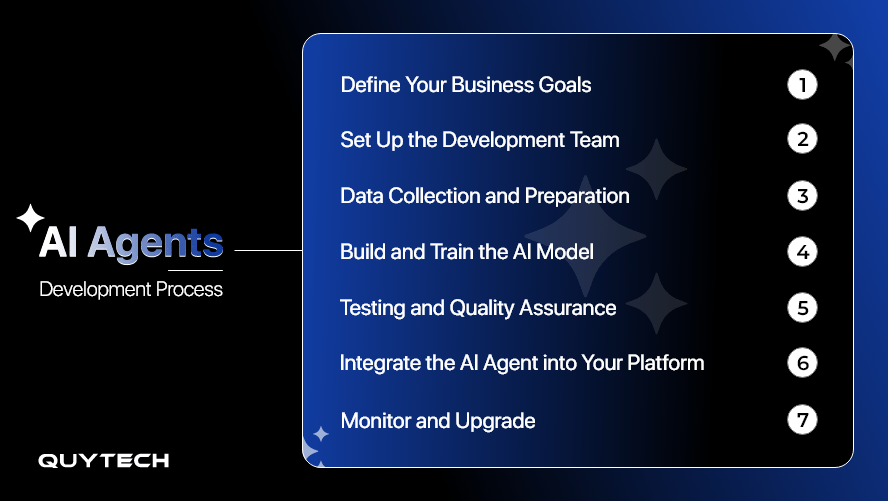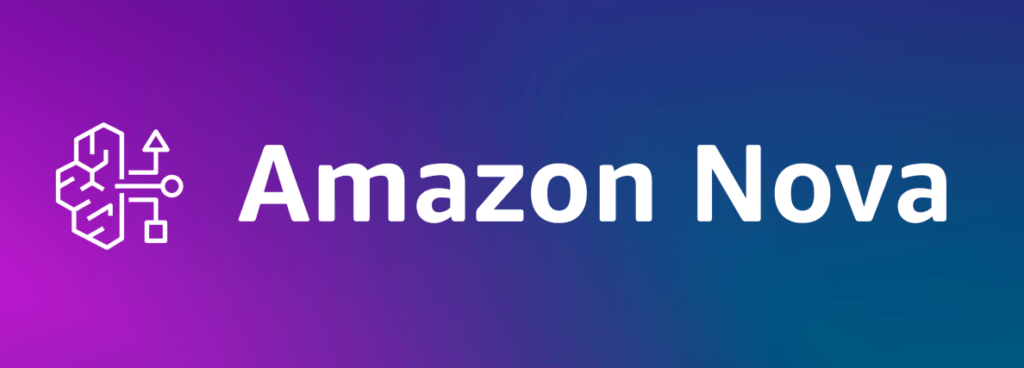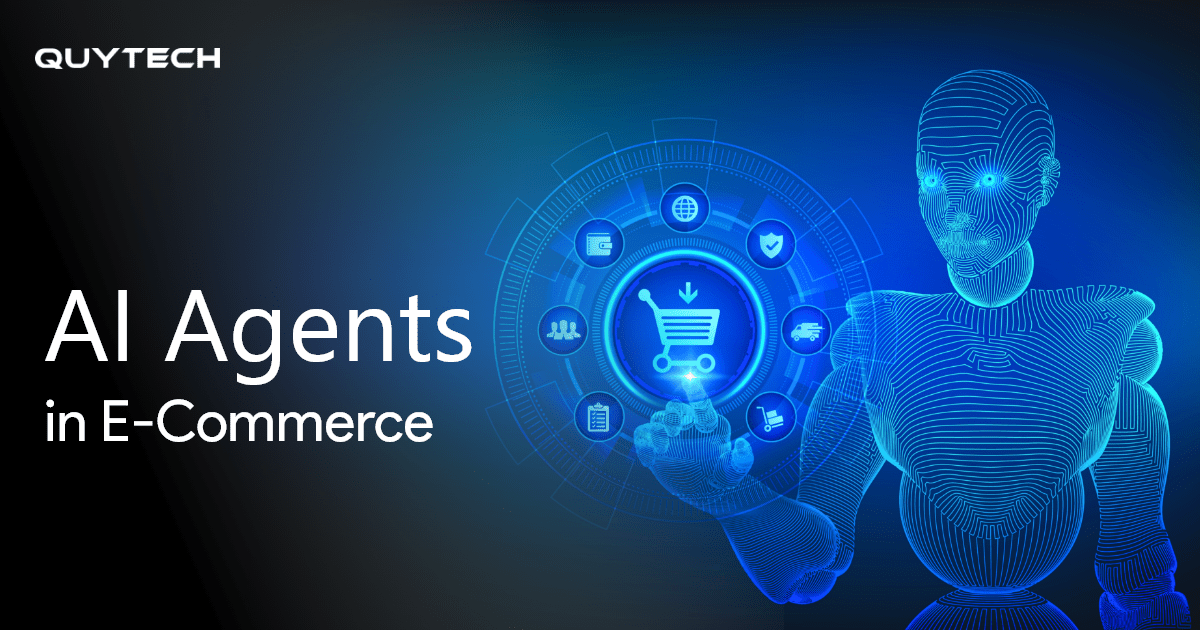In March 2025, Amazon launched an AI agent, called Nova, which can do shopping on behalf of users. It can navigate through the website, add products, and make a payment at checkout, all by itself.
Smart agents like Nova are a sheer proof that the e-commerce sector is witnessing a 360-degree transformation. The smart solutions that can do complex tasks and make decisions without human intervention, to enhance the users’ shopping experiences.
These AI agents have made shoppers ditch the traditional way of shopping, which used to include searching for the product on different e-commerce platforms, comparing their prices, checking ratings and reviews, adding them to the cart, and making a payment for them.
This blog is about AI agents in e-commerce and why all e-commerce businesses should build and implement AI agents in their websites, apps, and other platforms. Here, you will learn about AI agents, their use cases in e-commerce, benefits, development process, and top AI agents in the e-commerce industry.
Why AI Agents are Gaining Traction in the E-commerce Industry
AI agents are gaining traction in the e-commerce industry because of the benefits they offer. These agents can help e-commerce companies to provide personalized shopping experiences to their customers while saving customers’ time and effort in finding the right product.
To get the first mover advantage, businesses are collaborating with top AI development companies to build and implement AI agents in their e-commerce platforms and mobile apps.
According to Market.us, the AI agents in e-commerce market is growing exponentially, expected to rise from $3.6 billion in 2024 to $282.6 billion by 2034, at a CAGR of 54.7% during the forecast period.
Source: Market.us
E-commerce businesses are investing heavily in adopting AI agents to tackle challenges, such as rising customer acquisition costs, the high number of returns, evolving consumer expectations, and competitive pressure.
Keeping these factors in check, we shall be witnessing more e-commerce businesses leveraging AI agents in the coming years. Now, let’s understand the applications of AI agents in the e-commerce industry.
Use Cases of AI Agents in E-Commerce
In this section, explore the top use cases of AI agents in e-commerce platforms.
- Personalized Product Recommendations
In e-commerce, AI agents use machine learning to analyze browsing behavior, purchase history, and customer preferences to recommend products tailored to individual users.
For example, Amazon’s recommendation engine drives about 35% of its total sales by showing users products they’re most likely to buy. These personalized recommendations not only improve user satisfaction but also boost conversion rates, average order value, and customer loyalty.
Also, AI agents can analyze different sellers to find the product the customer is looking for, and give a brief comparison of sellers with pricing and other details.
This saves time and effort for users to find the product with the best price and enhances their shopping experiences.
- Virtual Shopping Assistants
AI agents act as virtual personal shoppers, helping customers find products faster by understanding their needs and preferences through conversational interactions. Think of a salesperson in the Levi’s showroom who helps you buy your favorite pair of jeans.
Similarly, in its online store, Levi’s “Virtual Stylist” helps customers pick the right jeans based on their fit and style preferences.
These AI agents, working as sales assistants, leverage natural language processing (NLP) to guide buyers through product discovery, compare options, and even answer questions like sizes available, return policies, and prices.
This leads to improved shopping speed and customer satisfaction while reducing cart abandonment rates.
- Customer Support and Query Handling
AI-powered agents handle customer inquiries 24/7, addressing common questions about orders, returns, payments, and product information.
This not only reduces operational costs by eliminating the need for hiring customer support executives but also ensures faster resolutions, enhancing customer satisfaction.
A perfect real-life example of this is H&M’s Ada chatbot. This AI agent successfully handles up to 70% of inquiries without human intervention, thus eliminating the need for hiring customer support teams and reducing the costs for H&M.
- Fraud Detection and Prevention
AI agents are also used to monitor transactions in real time to detect unusual patterns that might indicate fraud. In e-commerce, leading companies like Shopify use AI agents that flag suspicious activities such as account takeovers, payment fraud, and fake reviews.
This proactive fraud detection shields them from financial losses and helps maintain customer trust. Moreover, these AI agents leverage machine learning models to continuously learn and adapt to new fraud tactics, providing dynamic protection as threats evolve.
- Inventory and Supply Chain Management
AI agents can help e-commerce businesses to optimize inventory by predicting demand, managing stock levels, and suggesting restocks or markdowns.
Walmart, a leading e-commerce business, uses AI agents to forecast inventory needs across its stores and warehouses, ensuring shelves are stocked without overstocking.
This leads to reduced storage costs, minimized waste, and better product availability, which in turn improves customer satisfaction, drives sales growth, and mitigates situations like ‘product you are looking for is out-of-stock’.
AI Agents in Different E-Commerce Segments
AI agents are reshaping every corner of the e-commerce industry. The following are some examples of how they are making a difference in different e-commerce segments.
- AI Agents in Fashion
AI agents in the fashion segment are leveraged to assist shoppers by recommending outfits based on preferences, body types, trends, and even current weather.
Moreover, virtual try-ons and AI stylists like those used by ASOS and Zalando personalize shopping and help in boosting customer confidence.
- AI Agents in Electronics
In electronics, AI agents can be used to guide customers through technical specifications, suggest compatible accessories, and offer troubleshooting support.
Also, these agents can help buyers make buying decisions, as seen in e-commerce platforms like Best Buy and Newegg.
- AI Agents in Travel and Hospitality
AI agents in the travel and hospitality segment personalize journeys, suggest accommodations, predict fare prices, and offer real-time assistance to users.
Leading travel platforms like Expedia and Booking.com use AI agents to tailor travel recommendations based on customer interests and budgets.
- AI Agents in Grocery and Essentials
AI agents help users quickly reorder essentials, recommend products based on past purchases, and suggest recipe-based grocery lists.
E-commerce brands like Instacart and Walmart use AI agents to provide smart substitutions and faster checkouts.
- AI Agents in Health & Wellness
In this segment, AI agents are used to recommend supplements, fitness plans, and wellness products based on user goals or health data.
Apps like Noom and marketplaces like iHerb use an AI agent for provisioning personalized wellness journeys to their users.
- AI Agents in Home & Furniture
AI agents assist shoppers by offering product visualization and AR-powered virtual furniture placement, style recommendations, and sizing guides.
A popular furniture retailer, IKEA, uses AI agents to help customers visualize furniture in their homes before purchasing, reducing return rates.
- AI Agents in Jewelry & Accessories
In this e-commerce segment, AI agents can be leveraged to provide personalized jewelry suggestions based on style preferences, budget, and occasion.
They also offer virtual try-ons for items like rings and earrings, as seen on e-commerce platforms like Blue Nile.
- AI Agents in Secondhand/Resale/Refurbished Marketplaces
In resale marketplaces, AI agents authenticate products, match buyers with items based on browsing history, and optimize listings for sellers.
Platforms like Poshmark and The RealReal use AI agents to enhance the trust of users and efficiency.
You might be interested in: Types of AI Agents: Use Cases, Benefits, and Challenges
Why You Should Leverage AI Agents in Your E-commerce Business
The following are the top reasons why you must integrate AI agents into your e-commerce platforms.
- Increase in Sales
By adding e-commerce AI agents, you can increase your sales significantly. How? AI agents go through the customer’s preferences and understand what they are looking for.
Then, these agents recommend products and services that are exactly what the customer wants.
Additionally, these agents also provide personalized recommendations of cross-selling products and services to customers that they are likely to buy. This way, AI agents sell more products and services, increasing your overall sales.
- Enhanced Operational Efficiency
Another advantage of integrating AI agents for e-commerce is that they automate the tedious operations of your organization and free up your teams.
With AI agents, you can automate operations like billing, inventory management, pricing optimization, and more, depending on the customers’ demand and market trends.
This leads to increased operational efficiency, reduces mistakes, and your teams can be freed up so that they can focus on other strategic tasks.
- Improved Customer Satisfaction and Engagement
In e-commerce, engaging customers and keeping them satisfied is crucial as they will return to you again and buy more, eventually growing your business. AI agents can do the same for you.
AI agents, in the form of virtual assistants, can help customers in making buying decisions. Also, they can answer their queries, like what is the price of a particular product, how much discount is available on a product, or is a particular product is in stock?
By keeping customers informed and engaged, AI agents can improve your customer experience, keep them engaged, and enhance their satisfaction.
- Data-Driven Decision Making
The other benefit of AI agents in e-commerce is that they help you in making decisions, not random ones, but decisions that are backed by data.
AI agents integrated into e-commerce apps and websites can collect customer information, analyze their journey through the platform, what products they explored, what they searched for, and items they added to their wishlist.
Based on these data insights, you can optimize your sales and marketing strategies and increase your conversion rate. For example, if a customer added a laptop to the wishlist, you can offer discounts on it, increasing the chances that the customer will buy it.
- Competitive Advantage
With AI agents in e-commerce, you can get a strong competitive advantage. As discussed before, AI agents can automate your operations, enhance customer experiences, and help you in making data-driven decisions.
These agents will help you provide your customers with experiences that your competitors ain’t offering.
Hence, e-commerce businesses that adopt AI agents early often outperform their competitors in customer satisfaction, operational efficiency, and sales, and get a high competitive edge.
How to Develop AI Agents for Your E-commerce Business
Here is the step-by-step process to develop e-commerce AI agents for your business.

- Define Your Business Goals
To start developing AI agents for your e-commerce business, you need to first determine your goals and requirements. You must figure out the purpose the AI agents will serve, such as helping customers in product search, assisting with queries, fraud detection, or any other tasks.
Also, study other e-commerce AI agents to understand how they work, their functionalities, and pain points. This will help you understand AI agents better and help you find gaps to fill with your custom AI agents for e-commerce.
- Set Up the Development Team
To develop an AI agent for e-commerce, you need to set up a development team consisting of project managers, developers, quality analysts, and more.
As AI agent development for e-commerce is a complex task and requires years of experience and deep expertise in AI, we recommend that you hire AI developers who can help you build your AI agents.
Moreover, you can also choose to outsource the project to a leading AI development company that has expertise in developing AI agents and had developed for e-commerce apps and platforms.
- Data Collection and Preparation
In the third stage, you need to collect data, such as customer behavior data, transaction records, or product information, from different sources.
The type of data will depend on the AI agents’ core functionality. For example, if your AI agents are to streamline marketing efforts, then you will need data related to customer behavior. This data will be used to train the AI agents, and its quality will determine their functionalities and accuracy.
Therefore, it is important to collect data from different sources and refine it properly to make it consistent and enhance its quality.
- Build and Train the AI Model
Now, engage your development team to build the AI agent for your e-commerce business. You must use technologies like machine learning, natural language processing, predictive analytics, computer vision, and others to develop your AI agents, based on their purpose.
Moreover, your development team should also focus on creating a scalable and flexible architecture so that AI agents can evolve with changing market conditions and customer behavior. Post development, train the AI agents with the high-quality data that you have collected.
- Testing and Quality Assurance
After training, conduct rigorous testing to identify and fix bugs in the AI agents for e-commerce. Conduct manual and automated testing to ensure the e-commerce agent’s performance, scalability, and functionalities.
Moreover, you can also do pilot testing by deploying the AI agent to a small group of users before a full-scale launch.
This approach helps gather real-world feedback, uncover hidden issues, and make necessary improvements, ensuring a smoother and more reliable final rollout.
- Integrate the AI Agent into Your Platform
Once the testing is complete, integrate the AI agents into your e-commerce app or website. While the integration process, make sure that your existing system is not disrupted.
Hence, it is recommended to update the app or website during hours when there is the lowest traffic, to minimize the impact on active users.
- Monitor and Upgrade
After the deployment, keep a tight check on the functioning of the AI agent in your e-commerce platforms. Go through the user feedback to get insights into how your customers are perceiving the AI agent.
Also, at frequent intervals, update the AI agent with new and processed data and AI algorithms to ensure that it keeps functioning as per the expectations for the long run.
Top AI Agents Revolutionizing the E-Commerce Industry
Here is the list of top AI agents that are revolutionizing the e-commerce landscape.
- Google’s AI Assistant

Google’s AI assistant is developed to assist users with day-to-day activities, including shopping online. Users can use this AI agent to search for products or services on different websites, compare products and prices simultaneously, and even get answers to queries, like return policies, reviews, and payment options, in real-time.
Key Features
- Large language model (LLM)-based virtual assistant.
- Developed with machine learning, natural language processing, image recognition, and more.
- Seamless integration across Google Shopping and search platforms.
- Perplexity AI

Perplexity AI is another leading AI agent that is transforming the online shopping experiences of users.
It is a conversational search agent that answers complex queries, fetches real-time information, and provides product suggestions, which help users to make quick and informed decisions while using the e-commerce platforms.
Key Features
- Developed with conversational AI.
- Real-time data retrieval for up-to-date product insights.
- Personalized suggestions based on query context.
- Sephora’s Virtual Artist

Next on the list of top AI agents for e-commerce is Sephora’s Virtual Artist. Sephora is a leading personal care and beauty products e-commerce platform, and it has an AI agent called Virtual Artist.
The Virtual Artist uses augmented reality and machine learning to allow users of Sephora to virtually try on makeup, discover new products, and get beauty recommendations tailored to their preferences and skin tone.
Key Features
- Virtual try-on for makeup products using augmented reality (AR)
- Personalized product recommendations based on skin tone and preferences
- In-app tutorials and beauty tips based on user selections
- Shopify Inbox

Shopify Inbox is a messaging AI agent that enables e-commerce businesses to chat with their customers as they shop. With this tool, business owners can also review, edit, and respond to customers’ queries in real-time, and help them in making buying decisions, increasing overall sales.
Key Features
- Real-time customer messaging to assist shoppers.
- Centralized communication by integrating messages from different platforms
- Personalized product recommendations shared during chats to increase conversion rates.
- Amazon’s Nova

Amazon Nova (also referred to as Amazon’s Nova AI) is a next-generation AI agent initiative by one of the e-commerce leaders, Amazon.
Built using advanced large language models (LLMs), Nova is designed to integrate flawlessly into Amazon’s shopping experience, offering a much more conversational, intelligent, and personalized shopping assistant across Amazon’s app and website.
Key Features
- Powered by advanced LLMs designed by Amazon.
- Provides conversational shopping experiences to the users.
- Offers a personalized shopping assistant across Amazon’s app and website.
Read Also: Top 10 AI Agents in 2025
Conclusion
AI agents are doing wonders in the e-commerce world. Leading businesses are already using them to streamline their operations, assisting their customers with product discovery, visualization, and making informed buying decisions.
E-commerce AI agents are benefiting businesses by increasing their overall sales by recommending cross-selling products, improving customer engagement by assisting them during their shopping journey and answering their queries simultaneously, and helping them make informed decisions strongly backed with data.
If you also want to develop e-commerce AI agents for your business and reap the benefits like other brands, then follow the step-by-step process to build AI agents for your e-commerce business.
Also, if you want professionals to do the job for you, then reach out to Quytech, the top AI agent development company, specializing in building AI agents for e-commerce and retail businesses worldwide. Details on www.quytech.com
Frequently Asked Questions ( FAQs ) –
AI agents in e-commerce play vital roles, such as automating customer interactions, personalizing shopping experiences, optimizing operations, and more. These agents also detect fraud and help in enhancing marketing efforts, which enable businesses to grow faster and more efficiently.
E-commerce AI agents use machine learning algorithms to analyze customer data, behavior, and market trends. Based on this analysis, these agents deliver personalized recommendations, dynamic pricing, and business insights in real-time.
To develop AI agents for e-commerce, you can use cutting-edge technologies, such as machine learning, natural language processing (NLP), computer vision, predictive analytics, and reinforcement learning.
Depending on the complexity, technology stack, development team, and other factors, it takes approximately 3 to 6 months to develop and train AI agents for e-commerce. This tenure includes time for data collection, model training, testing, and deployment.
Quytech is the best AI agent development company known for building custom AI agents tailored to the specific needs of startups, SMEs, and large e-commerce brands.
At Quytech, we develop various AI agent solutions like virtual shopping assistants, AI chatbots, dynamic pricing engines, fraud detection agents, recommendation systems, and intelligent marketing agents.
Get in touch with our team and discuss your goals and requirements to start developing e-commerce AI agents tailored to your e-commerce startup.



